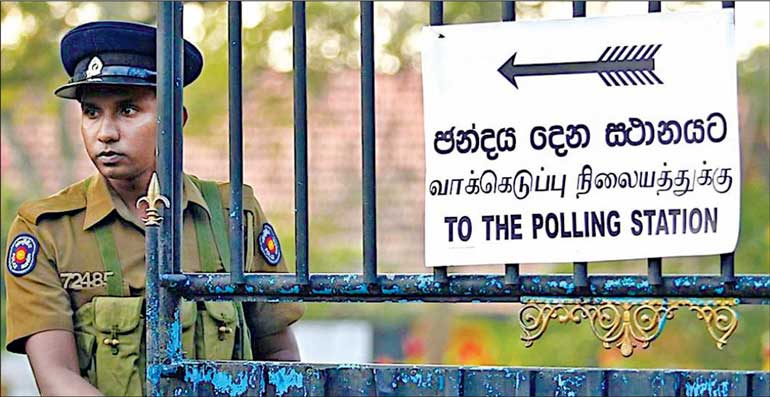Monday Feb 16, 2026
Monday Feb 16, 2026
Wednesday, 18 December 2024 00:22 - - {{hitsCtrl.values.hits}}

Unfortunately, Sri Lanka’s legislators have contrived to adversely impact on the peoples’ rights especially when it comes to the electoral process
 Sri Lanka’s citizenry is in a way fortunate that there is a written down constitution – a variety of benefits behold its citizenry. Successive political legislators have however, contrived to be guilty of violating the rights of the people – when it comes to elections.
Sri Lanka’s citizenry is in a way fortunate that there is a written down constitution – a variety of benefits behold its citizenry. Successive political legislators have however, contrived to be guilty of violating the rights of the people – when it comes to elections.
A written down constitution like Sri Lanka has, offers plenty of balance and equity for all:
1. Clarity and certainty
A written constitution provides a clear and definite framework for government structure, powers, and limitations. It outlines the rights of citizens and the responsibilities of the government that is easily accessible and understood by all.
2. Protection of rights
Our constitution includes rights that guarantee fundamental rights and freedoms for citizens. This protects individuals from potential abuses of power by the government and ensures that rights are upheld and respected.
3. Check on government power
A written constitution serves as a check on the power of the government by specifying the limits of its authority. It establishes a system of checks and balances that help prevent any one branch of government from becoming too dominant.
4. Stability and continuity
A constitution provides a stable foundation for the governance of a country. It establishes the basic principles and structures that endure over time, regardless of political changes or shifts in power. This continuity helps maintain stability and predictability in the functioning of government.
5. Judicial review
A written constitution often includes provisions for judicial review, allowing courts to interpret and apply the constitution to resolve disputes and uphold its principles. This helps ensure that the government acts within the boundaries set by the constitution and upholds the rule of law.
National identity and unity
A written constitution can help foster a sense of national identity and unity by embodying the values and aspirations of the populace. It can serve as a unifying symbol that transcends individual differences and binds people together under a common set of principles.
Overall, a written constitution provides a solid foundation for governance, protects individual rights, maintains the rule of law, and fosters stability and unity within a country.
Unfortunately, Sri Lanka’s legislators have contrived to adversely impact on the peoples’ rights especially when it comes to the electoral process.
Election dates
Political leaders from time to time have violated the sovereignty of the voter by not holding elections (Local Government, Provincial Councils, Parliamentary) when they became due.
There are serious challenges to democracy and the rule of law when politicians ignore at will the constitutionally ordered election. One recent example was the not calling of local elections under the Yahapalana government – whilst the relevant Line Minister, Faizer Mustapha pulled every trick in his book to ensure the elections will not be held.
If the NPP Government wished to make a lasting and sustainable impact for the greater benefit of the people – who are sovereign – using the luxurious two-third majority in Parliament, it would be in the definitive interest of the people to change the constitution making it mandatory to hold all elections on a specific date. This should be applicable to all types of national elections: local, provincial, parliamentary elections and presidential election too.
Appointment to Parliament from the National List
When people vote at an election they have voted for a party, a person or persons and the National List.
Voting for the National List is like voting in the Westminster system. That is, no preference vote but the candidates are nominated and declared before the election.
Therefore, party leaders’ responsibility is to appoint the candidates before the commencement of parliamentary sittings. If not, they are in violation of the sovereignty of the voter.
Ranil Wickremesinghe as the leader of the UNP has been accused of making a mockery of the voter by not appointing an MP and doing so months after the election – and months after the first sitting of parliament.
Similar delays are seen in the Wickremesinghe-led party and Sajith Premadasa-led party in the recently concluded Parliamentary elections. A violation of the sovereignty of the voter is taking place here and now.
What if the party leader decides not to appoint anyone from the National List for the next five years! It’s possible for such undemocratic actions to take place.
Sri Lankan party leaders have shown poor judgement in using their discretionary powers. Sajith Premadasa is inundated with requests for appointments on his National List. It is opportunity time for Premadasa to act strong and in the interests of his party and the interest of building a resoundingly strong and capable Opposition, by appointing those closest to the SJB than any others who joined the bandwagon – clutching at straws style. He must act with least delay and within the Constitution of our country, honouring the people’s rights. The time is not for vacillating.
The NPP using their unexpected and commendable two-thirds majority should work towards amending the constitution and stipulate that the National list member appointment to Parliament must be done prior to the commencement of the first parliamentary sitting after a general election.
This will put an effective end to horse trading in the run up to an election. In the event that there is a need to change a National List member during the currency of a parliament and after the initial sitting, the law must be amended for sake of clarity so that party leadership will be forced to make a selection from the originally declared National List.
Such amendments perhaps enjoined at the waist precluding crossovers from one party to another may well bring some form of sanity and equity to the parliamentary system in Sri Lanka.
It is entirely conceivable that ‘The Change’ Sri Lanka yearns for and that the Aragalaya screamed for, may well happen if these fundamentals are taken care of.
(The author can be reached at www.shauketaly.com.)